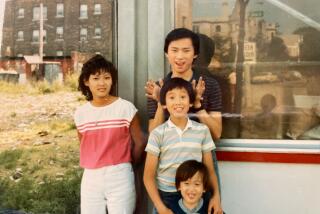The Good Earth
- Share via
In “Colors of the Mountain,” Da Chen recalled his childhood in a small Chinese village during the brutalizing years of the Cultural Revolution. By the end of the memoir, Mao Tse-tung had died and the dark chaos of those years had just begun to dissipate. “Sounds of the River” picks up the story with 16-year-old Chen standing on a train platform with the equivalent of $1.50 in his pocket, waiting to catch the express to the capital where he has received a full scholarship to study English at the Beijing Language Institute.
During the Cultural Revolution, knowing English was grounds for public self-criticism or worse--being labeled a lover of the West and therefore suspect, being beaten. But as an old roue on the train tells Chen, English-language majors are suddenly “hot.” They not only have their pick of jobs but they’re like honey to girls. More important, English is the one language that can offer a way out of China. Chen arrives in the capital with his goals set: graduate at the top of his class and go to America. Easier said than done.
Chen may have been the brightest English student back in his home village, but it takes him weeks before he begins to understand the English that’s spoken in his classes. Furthermore, he’s from the countryside, which means that the Beijing dialect his professors and fellow students speak is also nearly unintelligible to him. To make matters worse, Chen is very poor in a city of many temptations. And it’s China, so although it’s supposedly an egalitarian society, the Chinese students aren’t allowed to mingle with the foreign students, share in their better food or have anything remotely resembling their comfortable living arrangements. As a result, the kids in Chen’s dormitory are prone to hepatitis B, must stand in line once a week to share a spigot in the communal shower and are constantly reminded not to fraternize.
One other aspect of Chinese life makes Chen’s situation precarious: In a country of more than a billion people, everyone knows everything about everyone else. So just when things begin to go well, the dean calls Chen in to chastise him for not attending political studies class, then, knowing full well what the impact will be on the young man before him, maliciously notes that Chen is from a landlord’s family, one of the lowliest of the nine categories of enemies of the revolution and therefore open to all manner of persecution. “It was a dirty secret,” Chen writes, “a skeleton, a disgrace, an incurable handicap, an ugly birthmark.” This black mark has chased Chen from the countryside to Beijing, where model students now secretly report on his daily conduct. As Chen puts it, the campus is “just an old drama with a new cast, and politics [are] still the deadliest toxin” threatening his dreams.
Undaunted, Chen follows his father’s motto: Diligence will defeat the biggest foe. He works harder than any other student. He receives spiritual sustenance from his “pathetically powerless but enormously resilient” family. He embraces humanity right down to what might be termed bathroom humor. Despite numerous hardships and struggles--the debilitating illnesses, the constant worry about funds, the payment of bribes with no results and the mysterious death of a roommate--Chen maintains great optimism and humor.
He loves language and wonders about the meaning of “But-Why-Sir?” (Budweiser beer.) On a visit home, he gives his old buddies copies of Western girlie magazines with amusing results. He temporarily embarks on a side career as a translator for the first NBA tour to China in 1982. Suffice to say that back then China had neither tour buses nor hotel beds large enough to accommodate Kareem Abdul-Jabbar’s legs. Through it all, Chen, like so many immigrants before him, stays focused on getting to America. He never becomes bitter or cruel. Rather, his kindness is remembered and rewarded.
Chinese emigre literature has brought to these shores many new and interesting voices--the haunting lyricism of Ha Jin, the harsh worldview of Anchee Min, the righteous indignation of Adeline Yen Mah. Da Chen’s voice comes from the soil of China. He is earthy--perhaps too earthy for some readers--and sometimes his chronology wavers, but his exuberance for life and its possibilities set him apart from others in the genre.
“Sounds of the River” ends in 1985 with Chen saying goodbye to his parents yet again. This time he’s about to fly to America with $30 in his pocket and a mind filled with enough stories--and dreams--to fill many more volumes.
*
Lisa See is the author of “On Gold Mountain: The One-Hundred-Year Odyssey of My Chinese-American Family.”
More to Read
Sign up for our Book Club newsletter
Get the latest news, events and more from the Los Angeles Times Book Club, and help us get L.A. reading and talking.
You may occasionally receive promotional content from the Los Angeles Times.







